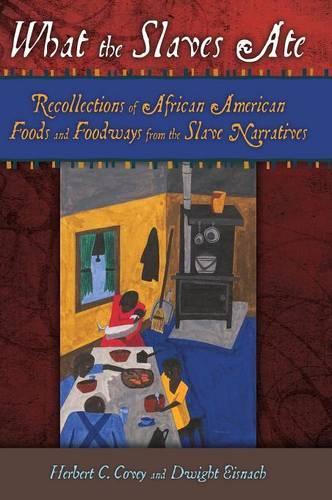
What the Slaves Ate: Recollections of African American Foods and Foodways from the Slave Narratives
(Hardback)
Publishing Details
What the Slaves Ate: Recollections of African American Foods and Foodways from the Slave Narratives
By (Author) Herbert C. Covey
By (author) Dwight Eisnach
Bloomsbury Publishing PLC
Greenwood Press
20th May 2009
United States
Classifications
Tertiary Education
Non Fiction
Cultural studies: food and society
390.25
Physical Properties
Hardback
328
Width 178mm, Height 254mm
851g
Description
Carefully documenting African American slave foods, this book reveals that slaves actively developed their own foodways-their customs involving family and food. The authors connect African foods and food preparation to the development during slavery of Southern cuisines having African influences, including Cajun, Creole, and what later became known as soul food, drawing on the recollections of ex-slaves recorded by Works Progress Administration interviewers. Valuable for its fascinating look into the very core of slave life, this book makes a unique contribution to our knowledge of slave culture and of the complex power relations encoded in both owners' manipulation of food as a method of slave control and slaves' efforts to evade and undermine that control. While a number of scholars have discussed slaves and their foods, slave foodways remains a relatively unexplored topic. The authors' findings also augment existing knowledge about slave nutrition while documenting new information about slave diets.
Reviews
This fascinating anthropological documentary excavates 1930s WPA-funded interviews to find the testimony of former slaves on the subject of food's role in daily life. In 12 absorbing, essay-style chapters, Covey (African American Slave Medicine) and independent scholar Eisnach explore how food was used to reinforce power relationships, how slave recipes gradually entered plantation kitchens, and how the Civil War changed entrenched traditions. Fourteen appendixes, categorized by food type, list specific ingredients mentioned by interview subjects and indicate the subject's home state, a record that facilitates awareness of regional customs.' * Library Journal *
This book is among the first to explore the diet and cooking behaviors of American slaves through the use of first-person narratives as opposed to archaeological evidence such as slave ship logs, plantation rationing logs and manuals on the treatment of slaves. Covey, an author and Vice Chair of the Colorado State Juvenile Parole Board, has teamed with Eisnach, and independent scholar and editor, to collect oral histories handed down from generation to generation and compiled by a WPA narrative project. The authors discuss African traditions and roots that influenced food consumption and break down the slaves' diet according to food category. * Reference & Research Book News *
contribute greatly to our knowledge of African-American diet and cuisine, a subject often clouded by myth, misinformation and ignorance. This book helps us understand the use of food as a control mechanism, through rationing, denial and timing of the supply as well as the effect of these issues on nutrition and health. Researchers tell the story of how the people they enslaved repurposed what was available to create new cuisines, often supplementing meager supplies by farming, fishing and hunting. Many recipes are included, and appendices list more than 300 foods or dishes found as researchers examined all 2,200 narratives recorded by the WPA. * Diverse: Issues in Higher Education *
Highly recommended for high school, community college, college and public libraries. * Catholic Library World *
Author Bio
Herbert C. Covey is the author of African American Slave Medicine: Herbal and Non-Herbal Treatments (2007) as well as of numerous books and articles on juvenile gangs and on drug addiction. He has been Vice Chair of the Colorado State Juvenile Parole Board since 1994 and Field Administrator for the Colorado Department of Human Services since 1999. Dwight Eisnach is an independent scholar and editor. He began his career as an investigative reporter and later served the Colorado Department of Human Services for some 25 years, successively as Legislative Liaison, Public Information Officer, and Administrator of the Colorado Juvenile Parole Board.
